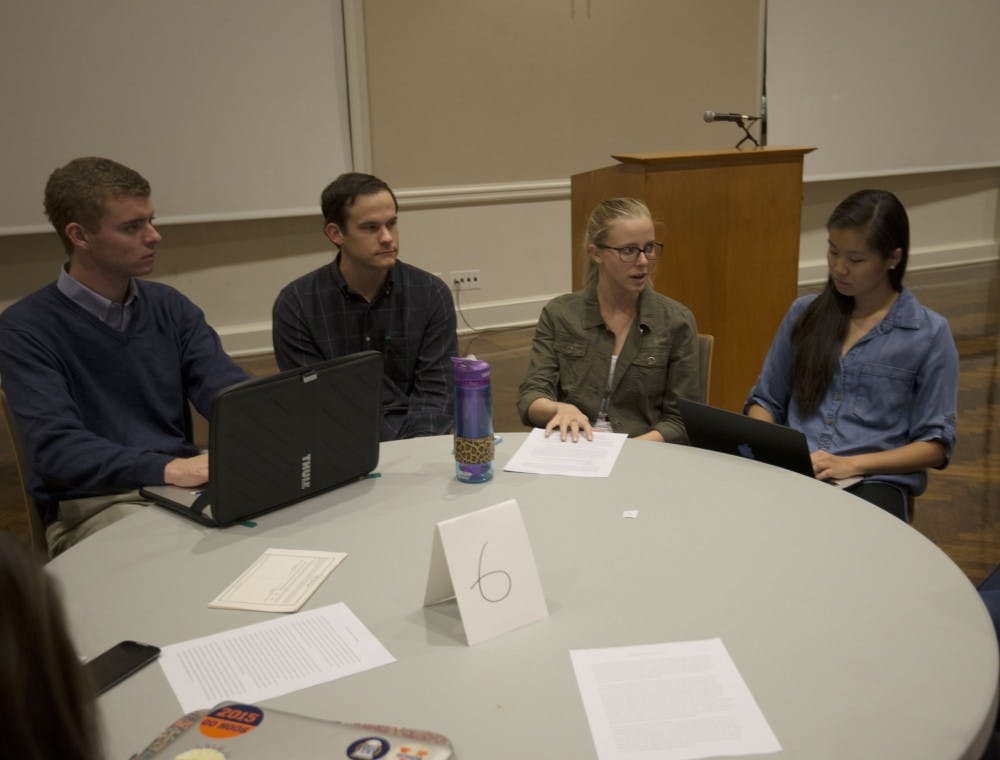The Honor Committee and Sustained Dialogue hosted a discussion Wednesday night to better determine where student opinion currently falls on the Committee’s single sanction policy.
At the event, participants analyzed various case studies and moderators led facilitated discussion in groups. Discussion also highlighted the recently-instated informed retraction policy, which gives students who plead guilty to an honor offense the opportunity to take a two-semester leave of absence instead of facing expulsion, as well as nuances within the system, such as how to approach unintentional honor offenses and varied awareness about the system across different schools.
Participants also discussed whether the single sanction is applied equally across students of varying years, as well as among students athletes and international students.
Arts & Sciences graduate student Eric McDaniel said he is in favor of the single sanction system as it stands — especially in the wake of the informed retraction.
“Now that the informed retraction is part of the system and there’s opportunity for forgiveness, I think it only strengthens the justification and power of the single sanction that all of those people in the community have agreed to uphold, and everything the honor system stands for,” McDaniel said. “I have a hard time seeing what further changes could be made [to the single sanction policy].”
Honor Committee Chair Nicholas Hine, a fourth-year College student, said he also supports the single sanction policy in full particularly in light of implementing informed retraction.
“I currently do not see myself supporting a modification to the sanction,” Hine said in an email. “The recent informed retraction amendment has largely mitigated my previous concerns about the system's lack of opportunities for forgiveness, and I still believe that the single sanction serves as a unique and important symbol of the University's commitment to the principles of honor.”
First-year College student Eve Immonen said she is also in favor of maintaining the single sanction, both in theory and in practice.
“I think that because of all the stress that society puts on students to succeed, success ends up getting emphasized above personal integrity — and the only way that that can be checked is through something that is as big as the single sanction punishment,” she said. “I know there’s a lot of criticism about how it’s too strong of a punishment and single sanction takes it too far, but if you think about how little value is put on integrity, it will make some students think twice. If students are swayed toward honor because of the single sanction, it’s worth it.”
Not all students agreed with the single sanction policy, however. The policy’s stringency was brought into question, with some students agreeing with single sanction in theory but saying they would be unwilling to report a friend or peer because of the weight conviction carries.
“I think they should add more trust and forgiveness to the system,” second-year College student Madeline Keach said. “I think the informed retraction is a step in the right direction, but there are still problems. People are risking losing scholarships and visas, so I don’t think it’s ideal. … I don’t believe single sanction is ideal in either theory or practice.”
On the whole, Hine said the event allowed students to effectively discuss a wide range of feelings about the system in an informal setting.
“We think it’s important to foster a dialogue about an issue that remains an important part of our honor system, but also a very controversial one,” Hine said.







